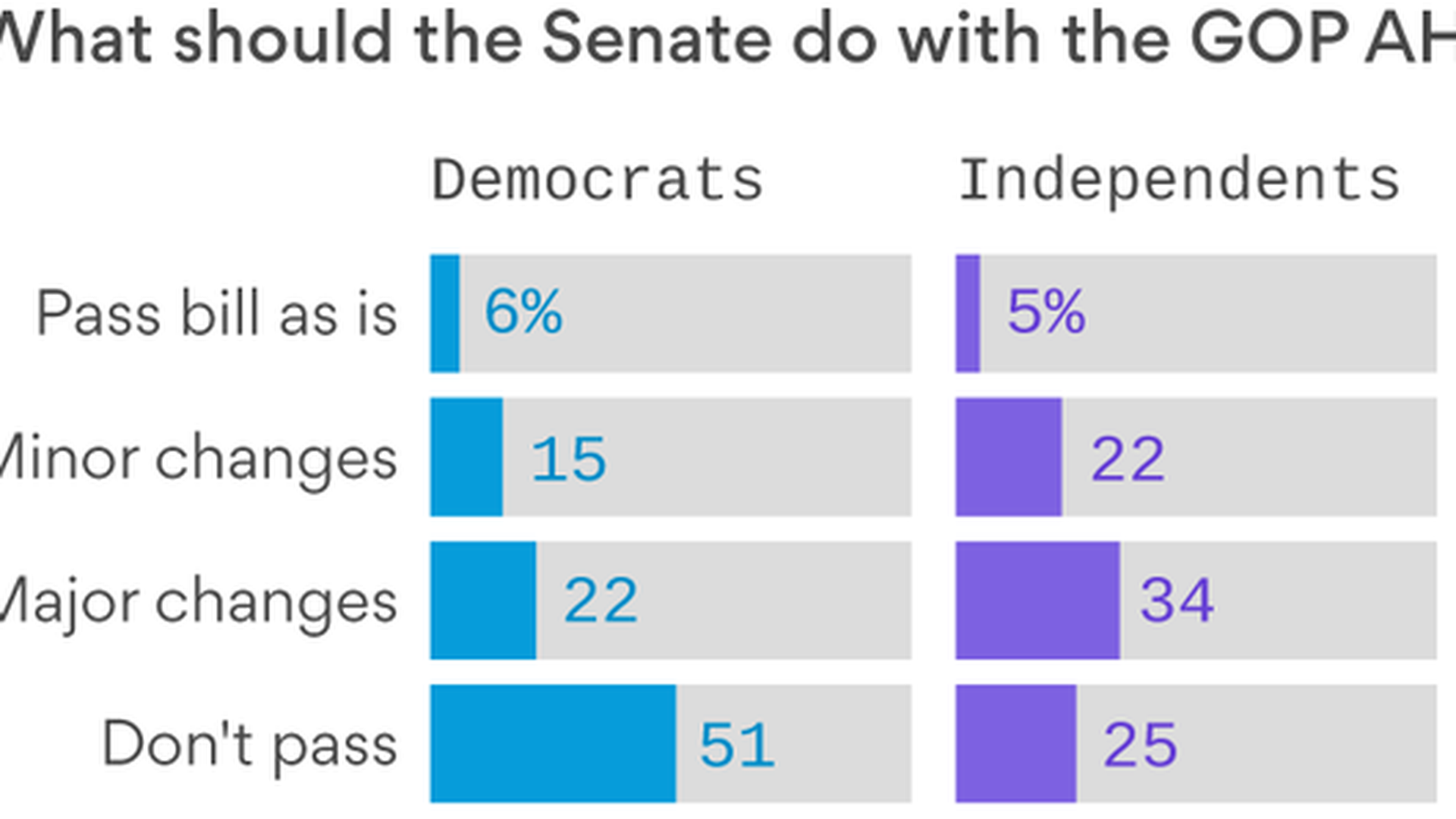Axios Vitals

May 31, 2017
Good morning ... Our Axios health care team has just expanded! We're thrilled that Sam Baker has joined us as the deputy health care editor. You may know his work from National Journal and The Hill, and he brings a lot of experience and a ton of smarts. We're teaming up on Vitals now, and he's going to help us make the Axios health care news stream even better, too.
Whatever happened to IPAB repeal?
There was a time when the Independent Payment Advisory Board — the panel that's supposed to recommend Medicare cuts if the spending grows too fast — was one of the most unpopular parts of the Affordable Care Act. Then it just disappeared until you forgot it was part of the storyline, kind of like Mama Pope on Scandal.
Now it could return, as Nicholas Bagley of the University of Michigan law school points out — because there will probably be a "determination" soon about whether Medicare spending is growing fast enough to trigger the IPAB cuts. It didn't happen last year, but Medicare spending could be high enough this year to require the cuts — a ruling that would be made by the chief Medicare actuary.
So, just in case, here are some IPAB facts you need to know:
It doesn't actually exist right now. Neither President Donald Trump nor former President Barack Obama ever appointed anyone to the board. So if the Medicare cuts have to happen, they would actually be made by the Department of Health and Human Services — if HHS secretary Tom Price can bring himself to do it.
IPAB isn't included in the House ACA repeal bill. Despite being a repeal target for years, it's not included because Republicans can't do it under the budget "reconciliation" rules.
But the board could be repealed separately. There are standalone IPAB repeal bills, including one from Rep. Phil Roe, that Republicans could take up if the Medicare cuts look like a real possibility. A senior GOP aide says IPAB repeal "is something that has bipartisan support and committees in the House are actively considering."
It will be a while before we know. The determination about Medicare cuts would be made around the same time as the next Medicare trustees meeting, according to an administration official, and that meeting hasn't been scheduled yet. Last year, it happened in June.
When SCOTUS says "patents," it kind of means "drug prices"
The drug industry's pricing structure took a hit yesterday at the Supreme Court, via a 7-1 decision about patent law and international sales. It's a complicated case, and not directly pharmaceutical related, but here's the upshot: The court's ruling could make it easier for middlemen to buy prescriptions drugs overseas, where they're heavily discounted, then resell them inside the United States, where they'd normally be much more expensive.Why it matters: It's not like the Supreme Court just solved our drug-pricing debate. Federal law still bans importing drugs from other countries. But if that ever changes, or if the "gray market" for imported, discounted drugs grows anyway, some experts fear that drug makers would raise their prices in the developing world. They might even quit selling certain products in some foreign markets — a possibility the industry itself raised in a Supreme Court brief.
The public really wants the Senate to rewrite the House bill
Partisanship is driving Americans' views of the GOP health care bill — and of the system it would replace. That's the gist of the Kaiser Family Foundation's latest tracking poll, which found stark partisan divides over…pretty much everything in health care. But there's a general consensus on one thing: Most Americans want the Senate to rewrite the House bill.
Why it matters: A less popular bill is less likely to pass, and harder to defend even if it does. Republicans know there's a playbook for capitalizing on an unpopular, party-line health care bill. It's a playbook they wrote.
Why it's so hard to do apples-to-apples with CBO
We got some smart pushback on our item yesterday about how the Congressional Budget Office's predictions on the ACA matched up with reality. So it's worth acknowledging that this stuff is never as cut-and-dried as it might seem.
Coverage: Peter Orszag, a former CBO director, said it doesn't work to directly compare the ACA's coverage gains — 20 million people — to CBO's prediction that 32 million would gain coverage. That's because the number of uninsured probably would have risen if the ACA had never become law.
- In reality, he says, it's more like 22 million people gained coverage. And CBO's 32 million prediction was also made before the Supreme Court made the law's Medicaid expansion optional, lessening the impact it could have had.
Premiums: A Senate Democratic aide points out that last week's HHS report, which found that individual market premiums doubled between 2013 and 2017, isn't directly comparable to CBO's prediction that individual insurance premiums in 2016 would have been 10 to 13 percent higher than under the old system.
- Why? Because the HHS report was comparing two different individual markets — one before the ACA, and a heavily changed one after the ACA. And CBO was only looking at one year. (Orszag also points out that premiums probably would have risen 30 to 50 percent between 2013 and 2017 anyway, even without changes in the law.)
The bottom line: Orszag's point is well taken — you should always consider what would have happened if the law had never passed. And it's worth noting that experts have different interpretations on the premiums — but the main point was that nothing in CBO's estimates warned Congress that people could see substantial premium increases because of the changes they were considering.
Mallinckrodt might sell its generic drug business
This would be a big deal in the business world (h/t Dan Primack): Mallinckrodt, the speciality biopharmaceutical company, is considering a sale of its generic drug unit for as much as $2 billion, Reuters reported last night. That would leave it focusing mostly on branded specialty pharmaceuticals. (One reason it might want to get rid of the generic unit, per Reuters: its products include opioids.)
More on the activist cloud hanging over Athenahealth
Two weeks ago, Bob Herman reported on how activist hedge fund Elliott Associates bought a hostile stake in Athenahealth, and how it wouldn't be surprising if Elliott pushed the cloud-based health care technology company to sell. Athenahealth CEO Jonathan Bush made his first public comments about Elliott at a J.P. Morgan event last week, indicating that he's at least open to hearing out Elliott.
Bush on why he thinks activist investing can be good: "It's a healthy thing to have someone come in and say, 'Your baby is fat. That's not a pretty baby, that's a fat baby.'"
But don't buy this as a happy relationship: Bush mentioned he spoke on the phone with Jesse Cohn, a senior manager at Elliott who is overseeing the Athenahealth stake, and basically said this while gritting his teeth: "[Cohn] gave me a nice 11 minutes before he filed…it sounds like he's got a lot of ideas."
The latest in health care lobbying
Bob Herman has your periodic reminder that D.C. is awash with lobbyists wrangling over the intricacies of health care policy, as well as the ACA repeal efforts. Here are some notable lobbying registrations from the past month:
The Blue Cross and Blue Shield Association hired Keith Fontenot of Hooper, Lundy & Bookman for a narrow reason: to lobby on "issues related to federal reimbursement for cost-sharing subsidies under the Affordable Care Act." Yep, the subsidies that Trump has threatened to cut off. Fontenot used to be Obama's top health care official in the Office of Management and Budget.Ford Motor Company hired Bose Public Affairs Group (specifically Victor Smith, who used to be Vice President Mike Pence's secretary of commerce), and Boeing hired Mehlman Castagnetti Rosen & Thomas for various, unclear health issues. Remember: Companies like Ford and Boeing have hundreds of thousands of employees with health insurance, and they are just as sick of the rising costs.Stride Health, an insurance brokerage startup that serves self-employed people, tapped Franklin Square Group to push for issues that "improve access to health insurance and other benefits for the independent workforce." This is Stride's first time lobbying.
What we're watching today: White House press briefing by Veterans Affairs secretary David Shulkin, 11:30 a.m. Eastern.
What we're watching this week: Senate Republican leaders and staff write the first draft of the health care bill over the recess.
What we're watching next week: The Senate comes back, reads their health care bill, and argues some more. Also, the investment bank Jefferies holds its global health care conference in New York City, June 6-9. And Facebook is reportedly holding a health summit on June 6 for pharmaceutical marketers, per CNBC.
Feedback? Tips? Now you can bother two of us: [email protected] and [email protected].
Sign up for Axios Vitals

Healthcare policy and business analysis from Tina Reed, Maya Goldman, and Caitlin Owens.

